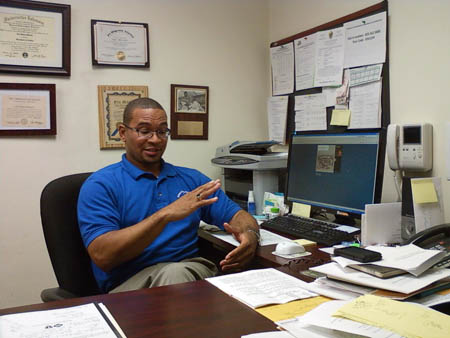July 28, 2011
 MITCHELL
MITCHELL
Like many graduates of prestigious preparatory schools, Eric Mitchell wears his class ring with pride. But 25 years after his graduation from The Lawrenceville (N.J.) School, Mitchell regards the band not as a mere memento of youth but as a symbol of perseverance.
“[It was] a phenomenal, life-changing, I’ve-never-seen-people-live-like-this experience,” Mitchell said of secondary schooling. “So I appreciate what opportunities mean to young people who don’t have them.”
Mitchell’s work as the new director of the Dorchester Neighborhood Service Center is informed by his own upbringing. The son of a single mother, Mitchell was hardly a child of privilege growing up in Trenton, N.J. “It wasn’t the ghetto,” he said of his neighborhood, “but it was subsidized housing.”
What he lacked in money, Mitchell made up for with an industrious approach to his studies. After eighth grade, he earned a scholarship to Lawrenceville, an award that helped him become the first member of his family to attend college—Tufts University, no less—after high school (his mother obtained a degree later in life.)
Today, Mitchell is in charge of the largest outpost in the Action for Boston Community Development (ABCD) network. He took over Feb. 28, after three years as the outreach and policy director of ABCD’s Head Start program.
The center serves Dorchester residents of all ages, offering programs like heating fuel assistance, free income tax preparation, housing and job placement assistance, and after-school and summer children’s activities.
But Mitchell’s specialty is kids. Last Friday, for instance, he sat down with a pair of teen-age boys who had just received their first paychecks as part of the center’s SummerWorks program, which is providing paid employment experience to 260 neighborhood teens and young adults this season. The conversation didn’t fall within Mitchell’s directorial purview; it was just something he felt compelled to do.
“We talked about how much money were they gonna save,” Mitchell said. “They got checks for two-fifty or whatever it is. What percentage of that had they planned on saving? And did they have a bank account? So we got a chance to really review what their mental plan was for how they were going to handle their money.”
Handling money will be one of Mitchell’s greatest challenges as director. Months ago, when he was still in the application phase, ABCD President and CEO John Drew warned him of the tenuous financial state of the job he hoped to inherit.
“I said to him, ‘You’ve got a very safe job right now [at Head Start],’ ” Drew recalled. “ ‘The Dorchester office is facing budget cuts. You could lose your job over there.’ He said he was up for it. You’ve got to like that attitude.”
During an interview at the Service Center’s Claybourne Street office, Mitchell chuckled at the memory of that exchange, then offered a sober rejoinder: “There’s nothing safe in the non-profit realm.”
“When we had [stimulus] funds,” he elaborated, “we had grown a number of programs—obviously, it was before my tenure—but we had a number of other programs that we were able to offer in our facilities. The funding has left, those programs have gone as well, so the challenge I have is really trying to do more with less.”
Alison Carter Marlow, who led the Dorchester Center for 16 years, has confidence in her successor. She knew Mitchell even before he joined the ABCD staff, back when he volunteered at the center during tax season almost a decade ago.
“I talked to my staff about Eric coming on board,” said Carter Marlow, now ABCD’s director of family and community services integration, “and the word I used was ‘thoughtful.’ I love the way his mind works.”
She and Drew describe Mitchell as personable and ambitious. He maintains an athletic build—he played football at Tufts and coaches Pop Warner in Hyde Park—and looks younger than his 43 years, thanks in part to a full head of hair that, he jokes, he keeps closely cropped to hide the gray. Armani glasses and a neat goatee frame his face and, on a recent Monday, he wore pleated dress slacks below his blue Dorchester Neighborhood Service Center polo.
Mitchell’s office is not so meticulously kept. Moving bags remain almost five months after his arrival. He has set a tentative cleanup target of September.
With the benefits of his time at Lawrenceville in mind, Mitchell has sent his own children, Amirah, 18, and Khalif, 16, to private schools. But he remains embedded in Dorchester by living in the neighborhood.
“For him, it’s personal, as well as professional,” Carter Marlow said of Mitchell’s work.
The patter of children’s feet audible overhead, Mitchell affirmed that notion.
“If we go upstairs now,” he said, “and we see a nine year old who’s having difficulty, the trajectory for that nine year old is not unknown. It’s clear. If the nine year old is not going to be prepared to do well in school, we know what the future is for someone on that path versus the one who is actually succeeding and doing well.
“When you see a child that’s young, that’s struggling, and you don’t intervene to do something, you are basically saying, ‘I know that the life path for this young person is limited, and I’m OK with that.’ And I’m not.”


